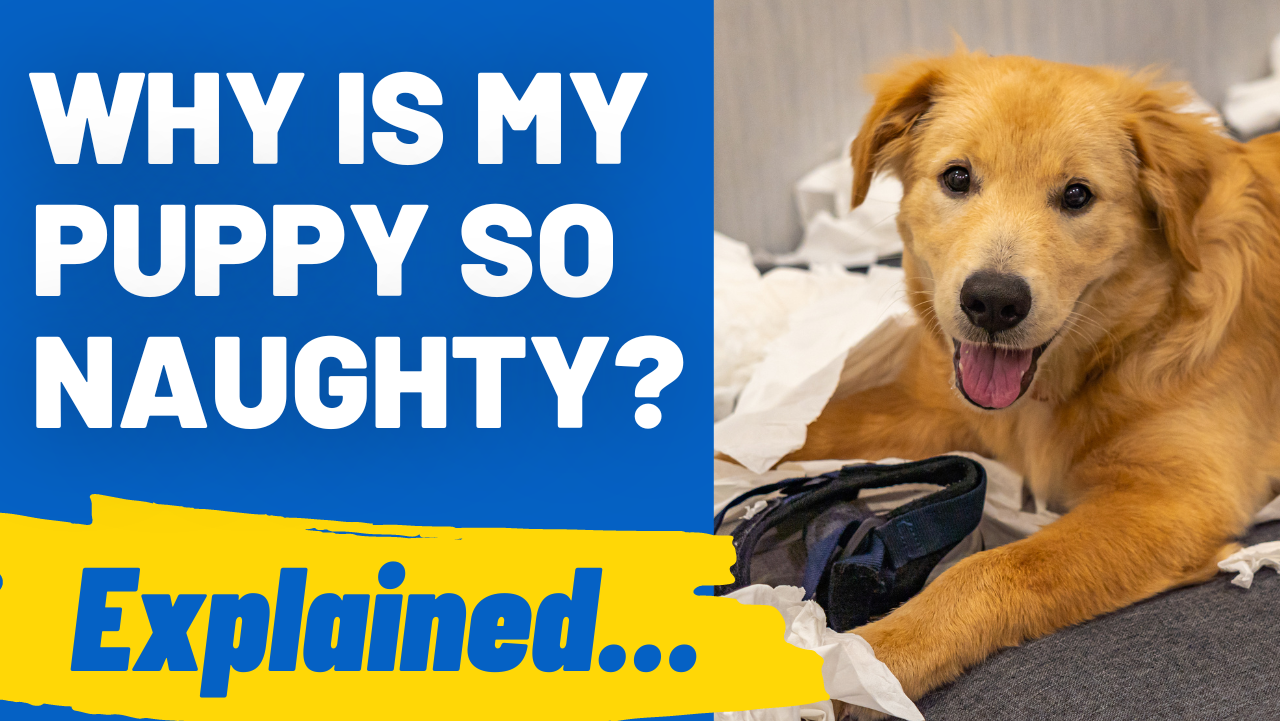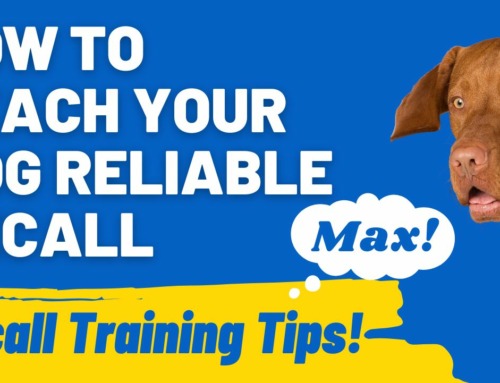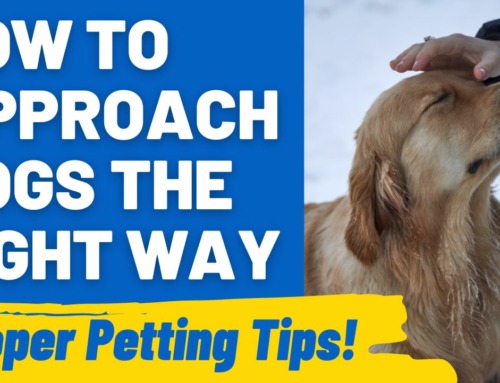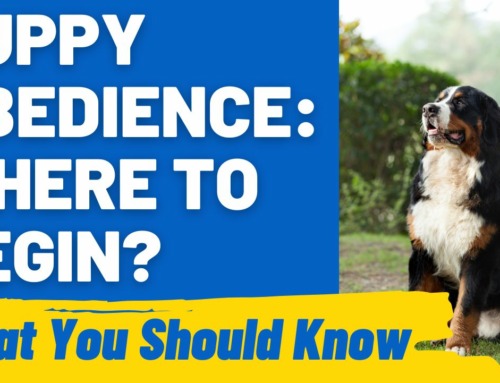Being naughty is just a part of being a puppy! It’s pretty much a requirement for any puppy to go through a phase where they are furry little tornados running around wreaking havoc however they can. That’s what it feels like to us humans anyway. The truth is puppies are always exploring the world around them and it can sometimes get them into trouble, and test our limits!
Why is my puppy naughty?
Puppies develop at an exceptionally fast rate and during this time they are learning about their world. They primarily do this with their mouth and a strong sense of smell. They taste, bite, and chew everything in site to understand what things are and if they are friend-or-foe. And when awake, they have boundless amounts of energy in which to do this!
They are also oblivious to knowing what behaviors are okay and what behaviors aren’t okay. It is our responsibility as pet parents to teach our puppies good manners by setting boundaries.
These boundaries will be tested during this puppy learning phase a lot, and it means we need to be consistent as puppy owners to remind them of the set boundaries. It also means we need to have enormous amounts of patience, and this can be tiring!
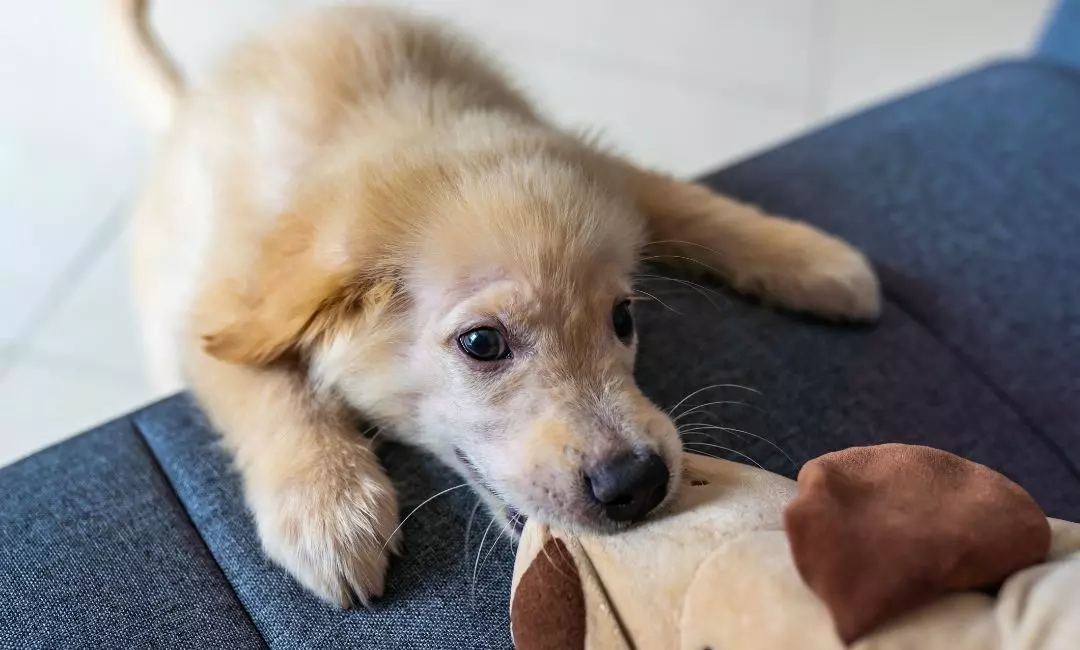
How do I stop my puppy from being naughty?
To stop a puppy from being naughty you’ll need to determine what motivates your puppy. Is it food? Toys? Enthusiastic praise? For most puppies, it is a combination of an exciting treat and lots of praise.
After you’ve determined what motivates your puppy, training can begin! If your puppy is being naughty, you’ll need to train them to opt for an alternative behavior instead.
Redirection is your key to success when it comes to setting boundaries for your puppy.
So, if your puppy is chewing on your furniture, remove your puppy’s mouth from the furniture and instead get him excited about a toy that is more appropriate to chew on.
You’ll also want to learn how to not only train your puppy but manage your puppy. If your puppy is getting into the garbage, constantly chewing on the furniture, and overall just being naughty, consider getting a baby gate to keep the pup out of certain areas.
Yelling at your puppy to stop doing something only creates anxiety. And anxiety then leads to problem behaviors such as separation anxiety, nuisance barking, and anxious chewing, or digging.
This is why a naughty puppy tests our patience so much. We need to be prepared to calm ourselves in the face of the destruction of your favorite shoes, and simply redirect.
Puppy-proofing a home and yard is the most important aspect of managing a naughty puppy.
When you can’t supervise your puppy, then it’s best to use a playpen or exercise pen. We have a great post on choosing the right pen for your pup here, Choosing a Dog Pen: Complete Guide (Size and Type)
This can save your sanity and give you a little break from the destructive might of your little fluffball! Don’t be afraid to limit your puppy’s access to certain areas and things you don’t want to be destroyed!
You might like to read our post, What Happens If You Don’t Play With Your Dog or Puppy?
What age do puppies stop being naughty?
Puppies stop being naughty once they are closer to the threshold of adulthood – usually somewhere around the 10 to 12-month mark depending on the breed.
They’ll also stop biting so hard and so often once they are done teething, usually somewhere after the six-month mark.
You might like to read our post Puppy Biting: When does it stop?
Don’t forget that physical activity, mental enrichment, and good training will all make for a better-behaved puppy.
Are puppies naughty on purpose?
We might joke around and say that our puppies are being naughty on purpose, but the reality is that they just don’t know any better.
Learning takes time and repetition. For example, even if you’ve taught your puppy not to jump on you before, it’s not because they are being naughty on purpose if they do it again. They simply need to be reminded.
Always redirect to a more positive outcome, or if your puppy is doing something for attention, such as lunging at your face, then turn your back on them, or give them a puppy time-out in a pen.
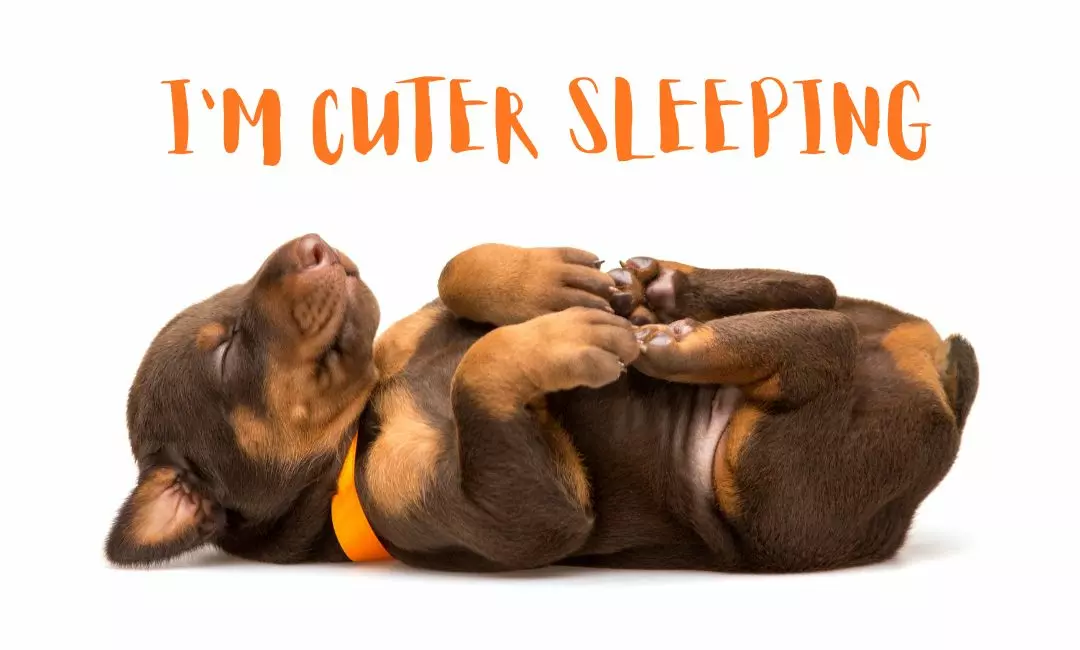
What is the hardest stage of a puppy?
The hardest stage of puppyhood depends on who you ask! Some will tell you that the hardest part or stage of puppyhood is the time during which you are actively potty training your puppy. This is usually in the 2 to 5 months area.
You constantly have to be watching your puppy for signs of needing to go potty. Then you also have to stick to a schedule of letting them out at consistent times throughout the day. And puppies are going to have accidents!
We have this article about puppy peeing you might like, Puppy Peeing a Lot: 5 minutes, 10 minutes, What is Normal?
There is just no way around it, no matter how hard you try. Just use it as a teaching opportunity, give a firm no, and take the puppy outside. Then be sure to immediately clean up the mess, so the puppy isn’t encouraged to try to potty there again.
Others might say that sleepless nights are the hardest part! Like potty training and crate training, creating good sleeping habits takes place around the 2 to 5-month time period.
Some puppies get it right away, but some puppies will cry in their crate at night and fuss for hours on end, causing you to lose sleep.
Many people say that the adolescent stage is the worst! This stage varies on the breed but usually occurs as the puppy starts nearing adulthood.
This is when the puppy will often start testing the limits to see if all those rules you taught them are still expected to be followed or not!
Some puppies will also start displaying more undesirable behaviors associated with puberty, like lifting the leg to pee and marking, getting territorial, food aggression, etc.
You might also like to read our post Will My Puppy Ever Be Nice?
How do you discipline a puppy that won’t listen?
It’s vitally important you don’t poison their name. It’s easy to yell your puppy’s name at them a million times, expecting results. But this will only teach them to ignore their name!
For discipline, use time-outs or a stern No! Then follow it up with a redirection to a positive behavior. For their name, only say it with love and praise.
Say their name often when giving treats, and say it when feeding them. Their name must be a positive association in order for them to want to come when you say it.
And if a puppy doesn’t listen, you simply need to give them a reason to actually listen to you.
If they are having fun and you want them to stop, but don’t have anything better to offer them except for an angry face and a scolding, why would they want to stop?
They just want to keep the party going! You must redirect that energy into something more positive and exciting.
Sometimes though, we humans forget that we are teaching little puppies and start expecting a little too much from them. A well-behaved dog is created over a period of time, starting with more straightforward tasks and expectations before moving on to more complicated ones.
If it feels like your puppy isn’t listening, it probably means that you are making too complex of a request.
Instead, try to make your request easier for your puppy to follow. It’s okay to take a step back during the training process and return to the things your puppy has already learned.
This will provide both you and your puppy a much-needed confidence boost knowing that you can work together to learn something and master it.
Then when you are ready to start again, try making the request easier for your puppy to follow. If you are trying to get your puppy to come to you when you call from a distance, and they just don’t seem to get it or is too distracted, try shortening the distance. Or only try doing this in a quiet location with fewer distractions.
It’s about baby steps made consistently over a long period of time. Then one day you will see your puppy is a dog and they are finally listening to you!
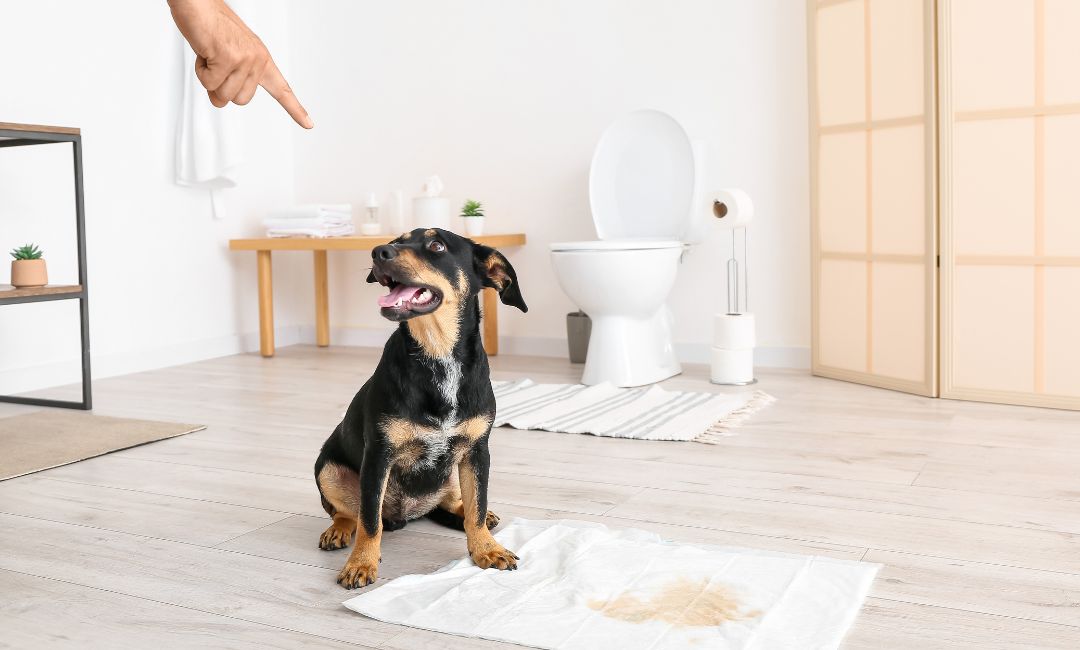
At what age are puppies the naughtiest?
Sometimes it might seem like the older your puppy gets, the naughtier they become. They go through stages much like human children, like the “terrible twos” or the “teenage years,” where they are especially challenging or naughty.
Especially around the six-month to the one-year mark, puppies seem to start displaying undesirable behaviors like barking obnoxiously, pulling on the leash, forgetting their potty training and going potty in the house, and even jumping up on people and destroying furniture, shoes, curtains, you name it!
So the answer to this depends on what puppy behavior you find most difficult. Every puppy age has its own unique set of challenges. And it can be testing! We have this post that might help you when the going gets hard: Exhausting Puppy: Are You Overwhelmed or Depressed?
Does owning a puppy get easier?
Thankfully, owning a puppy does get easier. You just have to get through the rough spots to make it to adulthood! With proper training and management at the puppy stage, you’ll have a well-behaved best friend.
Your puppy will likely have bouts of naughtiness throughout their first year, but after 12 months of age, your puppy will calm down.
Why are puppies so hard to take care of?
Puppies are so hard to take care of because they are little furry balls of energy who have zero manners!
It’s okay to admit that you are tired and that having a puppy is not as fun as you expected it to be. Some people even regret getting a puppy and that’s normal, too!
They are a lot of work. It’s also okay to ask for help from family and friends. Consider hiring a puppy sitter for an evening free from your pup if you are getting overwhelmed.
Also be sure to take your puppy to professional training classes to get some tips, tricks, and strategies to help you. Most importantly, remember that the puppy stage will end, and it does get better!

